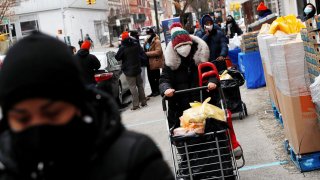
The Covid-19 pandemic has occurred amid heightened focused on economic and racial inequality in the U.S., and as the Biden administration seeks a large Covid stimulus relief package, the everyday financial needs and stresses are greatest based on race, ethnicity and gender.
Half (50%) of African-Americans, and 40% of Hispanics, are counting on another round of government financial assistance just to "get by" versus only 22% of white respondents who feel that level of financial anxiety, according to a new CNBC + Acorns Invest in You survey conducted by SurveyMonkey. Thirty-one percent of Asian-Americans said they were counting on stimulus relief payment.
Twenty percent of white respondents taking the survey said they don't need stimulus checks, and that the government should give the money to someone else who needs it. That's roughly twice the percentage of African-Americans and Hispanics who answered similarly.
Meanwhile, those who need the Covid financial assistance the most are less likely to receive it promptly. Though more than three-quarters (76%) of whites say they've received at least one Covid-19 aid payment from the government, only 67% of Hispanics and 65% of Blacks say they received the funds, according to the survey, which was conducted between Feb. 1 and Feb. 8 among more than 6,100 Americans. Among Asian-Americans respondents, 61% said they received payments.
Get Southern California news, weather forecasts and entertainment stories to your inbox. Sign up for NBC LA newsletters.
Louis Barajas, CFP, a member of the CNBC Financial Advisor Council says the data on payment receipt may be explained by lower reliance on direct deposit by Latinos.
"Checks are likelier to get lost in the mail, so if you don't have a bank account for direct deposit, then it's easier to miss your stimulus payment," says Barajas.
Emergencies and everyday expenses
Money Report
The survey underscores the disparate day-to-day impact of the coronavirus pandemic by race and gender.
A plurality of survey respondents spent the stimulus payment on everyday expenses (31%), but a higher proportion of Blacks and Hispanics spent it on rent or mortgage payments than whites. Among Latinos, 27% spent it on housing payments, the highest proportion of any group in the survey. Twenty-six percent of Black respondents indicated spending a stimulus payment on housing, versus 12% of whites.
The differences in access to liquid savings are also apparent: While 58% of whites would access their savings account if they needed $2,000 in an emergency, only 38% of Hispanics surveyed would do the same. Meanwhile, 14% of Latinos — the highest proportion of any group — responded that they would borrow it from a friend or relative, highlighting, perhaps a savings or traditional banking gap between racial groups.
White (20%) and Asian-American (25%) survey respondents were the most likely to say they saved a Covid stimulus payment, versus 9% of Black respondents and 14% of Latinos.
Polling conducted throughout the past year by SurveyMonkey and other research firms has continually shown people of color to be facing greater economic challenges as a result of the pandemic, including lost jobs and businesses shuttered, and they're less likely to have been able to work from home, putting them at increased risk of being exposed to Covid-19, according to SurveyMonkey.
More from Invest in You:
Smallest businesses getting extra PPP help. What to know before applying
Black small-business owners are being left behind in pandemic, survey finds
Black leaders offer several key steps to help close racial wealth gap
"These latest data demonstrate how people of color are in a much more precarious financial position, which the pandemic has only exacerbated," said Laura Wronski, science research scientist at SurveyMonkey. The firm's recent polling shows that Biden's $1.9 trillion stimulus plan gets support from about seven in 10 people across the country, which is very high, but that support is even higher among minorities. "These latest data give a clear reason why: Blacks, Hispanics, and Asians are just more reliant on the federal help during this crisis, and they're more worried than others that they won't be able to get by without it," she said.
73% of Americans have at least one form of debt, according to the survey, and Latinos are the group with the highest proportion of credit card debt and student loan debt, while African-Americans are the most likely to have medical debt.
"I've seen that some Hispanics have been taking on a lot of credit card debt during the pandemic to pay for essential expenses," Barajas said.
Additionally, 40% of Americans had to take emergency measures to manage their finances in the wake of the pandemic. The top three actions taken: tapping emergency savings (13%), borrowing money from a family member or friend (12%), and using a food bank (11%).
"Latinos are very family-oriented, and I've seen many families helping each other out more than ever. I've seen many families lending their kids money when they've lost jobs because of Covid," Barajas said. "Family unity and pooling resources has been a big help for Latinos during this crisis."
Minority females were most broadly affected by the pandemic. African-American and Hispanic women report the highest rates of emergency financial measures, with 23% of African-American women and 17% of Hispanic women borrowing from family or friends, compared to only 9% of white men. Additionally, 21% of African-American women and 19% of Hispanics used a food bank, compared to 9% of African-American or Hispanic men, and 8% of white men.
Some Latinos, African-Americans and Asian-Americans were able to take positive financial steps during the pandemic, with 10% of Latinos opening a bank account and a retirement account for the first time in the past 12 month, and 11% of African-Americans making similar moves. Thirteen percent of Blacks and Hispanics bought stocks for the first time; that figure was 14% among Asian-Americans. Some Latinos also achieved the American dream of home ownership for the first time: 6% of Latinos bought their first home during the pandemic.
SIGN UP: Money 101 is an 8-week learning course to financial freedom, delivered weekly to your inbox.
CHECK OUT: Here's the credit score you need to buy a home via Grow with Acorns+CNBC.
Disclosure: NBCUniversal and Comcast Ventures are investors in Acorns.






